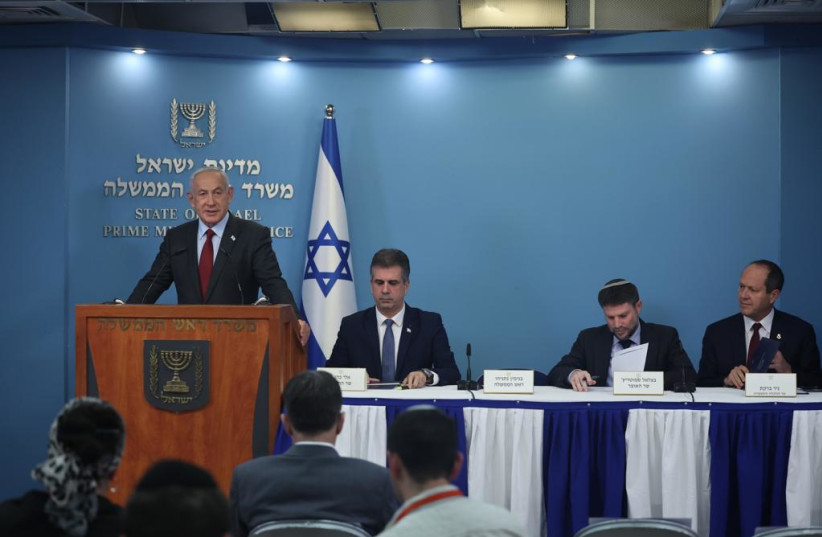High Court of Justice president Esther Hayut is attempting to interfere in the Knesset's legislative process, Knesset Constitution, Law and Justice Committee chairman Simcha Rothman at his committee's Wednesday morning session, after reports were published that she told President Isaac Herzog that talking on the proposed judicial reforms had to be accompanied on a pause on the committee sessions.
"President Hayut is invited to come and express her opinion in the Constitution Committee, the attempt to prevent legislation in the Knesset is very serious," said Rothman. "Her demand to stop the discussions in the Knesset by law has no place in a democratic country, I call on her to retract her words."
Rothman said that the committee was the place to talk about any issues with the judicial reforms that were proposed by Justice Minister Yariv Levin at the beginning of January. He said that any attempt by the High Court president to stop proceedings was a violation of the separation of powers.
The chairman condemned aggressive rhetoric by critics of the reforms, referring to members of Knesset referring to the process being like D9 military bulldozers and former High Court president Aharon Barak comparing the legal proposals to a revolution with tanks.
"Anyone who wants to come and discuss in order to prevent this [discourse], I will extend my hand," said Rothman.

National Unity Party MK Orit Farkash-Hacohen agreed with Rothman that negotiation and compromise were critical but disagreed with the criticism of Hayut. She said that it was necessary to make clear where all sides stood, and there was not enough faith in the process, expressing her own reservations.
"The whole purpose of the draconian legislation is to create a situation where a prime minister who has indictments and is unwilling to accept the norm wants to prepare the judges for himself, as well as a convicted minister who is determined to come back with legislation that will crush the ministers' ability to discuss appointments," said Farkash-Hacohen, referring to Prime Minister Benjamin Netanyahu's ongoing corruption trials and Shas chairman Arye Deri, who was attempting to return to his ministerial posts after a High Court ruling ordering his removal. "The government has a personal agenda and the negotiations are irrelevant."
The bill and human rights
Former law committee chairman and Likud MK Uriel Lynn called for unity and compromise, but said that "The bill that was put before the committee contradicts basic human rights in Israel."
Lynn explained how for Basic Laws on human rights there was there "was a consensus of all the parties, the religious parties worked together with us in all the discussions and formulated the fundamental rights. We made the compromises for a Jewish and democratic state," granting judicial review to the High Court to defend those rights.
Rothman challenged that the process had left out a provision on equality and that if he wanted to add it if it would be accepted by the High Court. When Lynn said it and other items were removed to avoid controversy, Rothman said that he didn't think avoiding controversial items wasn't the way to legislate and that the last word on legislation should be the Knesset and not the court.
Legislation of that last word, an Override Clause, was included in Levin's reform plan. The provision would allow for the Knesset to overrule court decisions with a simple majority. Lynn said he was not against the Override Cause under the right conditions and structure.
Rabbi Ido Rechnitz of the Mishpetei Eretz Institute proposed a compromise structure for another provision of the draft amendment to The Basic Law: The Judiciary, to replace the representatives of the Bar Association in the judicial selection committee with two district judges chosen by the speaker of the Knesset.
"This will make it possible to appoint judges that the coalition wants and on the other hand it gives a majority to the judges in the committee so that five out of 9 will be judges," Rechnitz explained. "You can also count on judges to protect the High Court and if a candidate who does not meet the criteria is presented, they will oppose and prevent his candidacy."
Farkash-Hacohen argued during her own presentation "why do we need to change the judicial selection committee" as the other provisions limit the power of the court so greatly who is on the court is irrelevant.
"At this point, there is already no court," she said.
